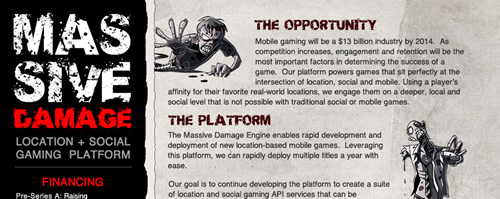"It's the narrative, stupid"
"Despite Steve Job's aversion to selling by PowerPoint, pitch decks have become the preferred option, and for early stage startups, narrative is more important than hard data. Identifying a secular trend is the key. Maybe it's the Zuckerberg effect."
In Silicon Valley, for example, most venture capitalists (and entrepreneurs) have foregone the bulky Business Plan in favour of a short PowerPoint (pitch deck) plus an Executive Summary, plus a pro forma, that lets them understand the entrepreneur's business proposition, market size, goals, direction and management team in just a few moments (VCs are very busy people). Despite Steve Job's aversion to selling by PowerPoint, pitch decks have become the preferred option, and for early stage startups, narrative is more important than hard data. Identifying a secular trend is the key. Maybe it's the Zuckerberg effect.
Do you even need a business plan?
Neil Patel says no. Patel is the founder of KISSmetrics, a software firm which offers customer analytics to small business. In a post on his blog, he explains Why Entrepreneurs Shouldn’t Write Business Plans, and says business plans are a waste of time. "If you think having a business plan is going to increase your odds of success, it won’t," says Patel. "There are no stats proving that writing a business plan is going to help you succeed… so do yourself a favor and save your time." Interestingly, the number of comments (pro and con) he received on his article were quite staggering. He clearly touched a nerve because his article sparked a lengthy debate on his site, QuickSprout, one that has raged on for three years.
There are three kinds of business plans
(so say the pros at accounting firm Deloitte & Touche)
Summary Plans -- A summary plan of 10-to-15 pages works best for early stage companies without an extensive history, or for entrepreneurs with a history of success.
Full Business Plans -- A traditional business plan of 20-to-40 pages is typically used to get for financing. It spells out a company’s operations and projections in detail.
Operational Business Plans -- For established companies, a business plan can be an important source of guidance to top managers. [...] an operational business plan must be lengthy — typically well in excess of 40 pages and sometimes as long as 100.
Operational Business Plans -- For established companies, a business plan can be an important source of guidance to top managers. [...] an operational business plan must be lengthy — typically well in excess of 40 pages and sometimes as long as 100.
And then there's this
 |
| Executive summary developed by Massive Damage |
This is not some MBA student's artistic fantasy. This is an actual one-page executive summary developed by an Ontario gaming company called Massive Damage. You can see the full page here.
Here are the guidelines they used to create it, according to Massive Damage's founder Ken Seto.
Keep it to one page if possible, it’s a summary, not a pitch.
If you have no eye for design, hire one or get a designer friend to help out.
If you have metrics, put the good stuff front and center. Feel free to use vanity metrics for big impact but make sure you also have engagement metrics.
Leave enough room for your Team section. Use pictures and previous startups/accomplishments.
Include awesome visuals. Sure you can’t use zombies for every startup but give it some personality. Use bold infographics or charts.
One word I would use to describe it?
Brilliant.
